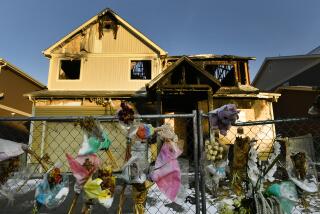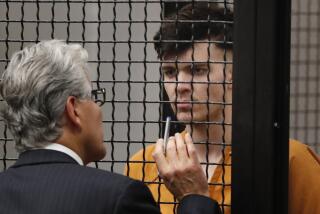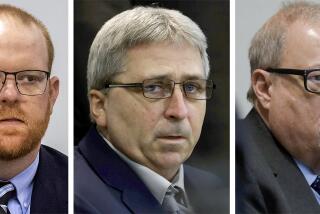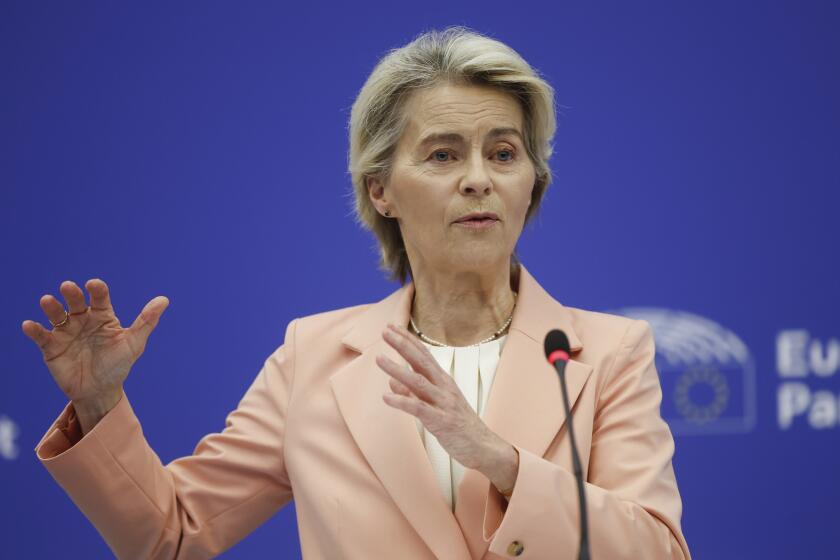Motive unsettled in slayings of Muslim students in North Carolina
In early January, Amira Abu-Salha drove to her daughter Yusor’s apartment to return her wedding dress. Yusor had just moved in with her husband shortly after their Dec. 27 wedding.
Minutes after she parked, Abu-Salha said, she was accosted by an irate next-door neighbor who demanded she move her van. As a family friend, Imad Ahmad, later recalled, Yusor asked the man what her mother had done to so infuriate him.
“Yusor told me he said, ‘I don’t like the way you look,’” Ahmad said.
After the encounter, Ahmad recalled, Yusor asked her husband: “Would he have done this if we were white?”
Yusor later sent her husband a text, reminding him to tell friends and family not to park near the spots claimed by “that crazy neighbor,” Ahmad said.
The neighbor was Craig Stephen Hicks, 46, a community college paralegal student who was much older than the graduate students who dominate the Finley Forest neighborhood.
Hicks now stands charged with shooting and killing Yusor, 21, along with her husband, Deah Shaddy Barakat, 23, and her sister, Razan Mohammad Abu-Salha, 19, on Feb. 10. A judge has approved the prosecutors’ request to pursue the death penalty.
The slayings have triggered intense scrutiny of the gunman’s motives amid fears of Islamophobia. Family members say the three Muslim students were targeted because of their religion. Their claim has collided with the initial Chapel Hill police narrative that Hicks exploded in rage over a parking dispute.
The issue has so consumed Farris Barakat, Deah’s older brother, that he has barely had time to grieve. He has taken a leave from his job as he strives to honor the memories of the three students and to pressure authorities to investigate their deaths as a hate crime — and even a terrorist act.
Hicks’ outbursts spanned several months, but became more menacing after Yusor moved in and her sister began visiting more often, according to Farris and Ahmad. They say Hicks focused on the women’s appearance — what a police search warrant called “Muslim headdresses.”
“This guy hated religion, and my family is outwardly religious,” Farris Barakat, 24, said of Hicks, an avowed atheist whose Facebook page was studded with rants condemning organized religion as superstitious and destructive. The page also featured a photo of a handgun.
“I want to know why this guy can express such hostile views toward religion, be a hateful person, then walk into my brother’s apartment and execute him and shoot these two women who are Muslims,” he asked. “How is that not a terrorist attack?”
For months, Farris Barakat said, Hicks had confronted him and his brother over parking and noise. On two occasions, Hicks raised his shirt to reveal a gun on his hip, Farris recalled.
Ahmad said Hicks made sure he saw the gun when Hicks complained to Ahmad and Deah last October that they had been too loud during a game of Risk in Deah’s apartment. Hicks said the noise had awakened his wife. “And tell your friends to park properly next time,” Hicks added, according to Ahmad.
Farris said he apologized both times and moved his car. Deah had also apologized to Hicks, he said.
“We moved the cars, very gladly, very kindly,” Farris said.
Deah called the apartment management and was told that no one could claim a “guest space” beyond a single assigned space, Farris said. Deah and Yusor considered calling the police, but they feared that would further antagonize Hicks.
Instead, Deah texted friends and family a parking map specifying where to park — and where not to, Farris said.
The killings have raised fears among Muslims nationwide, including the estimated 38,000 Muslims in the area. Many view the parking dispute motive cited by police as a denial of persistent Islamophobia, said Madihha Ahussain, a staff attorney for Muslim Advocates, a civil rights group in San Francisco.
“The first thing people say when they think of an act of violence against American Muslims is that it was random,” Ahussain said during a legal seminar at nearby Duke University attended by Farris. “In this case, unfortunately, it was reduced to a parking dispute.”
Hicks was the domineering crank of Summerwalk Circle, obsessed with parking and noise. He called tow trucks so often to remove perceived parking offenders that the towing company stopped responding to his calls. A police search warrant said Hicks “kept pictures and detailed notes on parking activity.”
Concerned residents held a community meeting last year to discuss what to do about Hicks’ outbursts, said neighbor Samantha Maness, 25.
“He made everyone feel uncomfortable and unsafe,” Maness said, but nothing came of the meeting.
According to a prosecutor’s courtroom account, Hicks shot Deah as he stood in the doorway to the newlyweds’ apartment just after 5 p.m. Feb. 10.
As Yusor and Razan screamed, Hicks stepped inside and shot them, the prosecutor said, adding that they were still alive when he shot each woman again, in the head. Then Hicks shot Deah a final time as he walked out of the apartment, the account says.
Police said they found the weapon used in the killings in Hicks’ car and 14 rifles and handguns in his apartment.
The young Muslims were thoroughly American — in the way they talked and their college-student lifestyles and in Deah’s love of basketball.
Farris and Deah were born in Raleigh, where their father, Namee Barakat, moved after coming to the U.S. from Syria to study in Texas.
Both sons graduated from North Carolina State University. Deah enrolled in dental school at the University of North Carolina, and Farris took a manager’s job at a courier company that delivers auto parts.
The Abu-Salha family, which is of Palestinian origin, lives near the Barakats in Raleigh.
Yusor, who was born overseas but brought to the United States as an infant, graduated from North Carolina State and was to join her husband in dental school at UNC this fall. Razan was enrolled in the design school at N.C. State.
Deah and Yusor raised money to provide dental care to Syrian refugee children in Turkey. The couple and Razan also helped feed the homeless.
Deah had been planning to travel to Turkey this summer to treat children in a border refugee clinic. He recorded a video seeking donations. By the day he died, he had raised $16,000 toward a goal of $20,000.
After the killings, as part of a worldwide response magnified by a #muslimlivesmatter social media campaign, Deah’s fundraising site topped $500,000.
UNC and N.C. State announced scholarship or endowment programs honoring the three, referred to as Our Three Winners. That was a Facebook site Farris created to honor the students’ memories in hopes, he said, that “they wouldn’t be treated as just victims.”
The FBI announced two days after the killings that it had begun a preliminary investigation into the possibility of a hate crime. Lt. Joshua Mecimore, a Chapel Hill police spokesman, said investigators were looking into all possible motives, including bias toward Muslims.
Farris wants the killings investigated as a terrorist act.
“We’re Americans,” he said. “We’re loyal. We are peace-loving. But you have to show us these terrorism laws aren’t just aimed at us.”
Farris recalled Deah’s and Yusor’s wedding in December. At the reception, Yusor was videotaped jokingly describing how she had “shot” Deah at the apartment door with a water pistol. Farris was struck by her choice of words.
“She said the poor guy had his hands up for a hug and she shot him,” Farris said. “She used the words ‘gun’ and ‘shooting’ and ‘parked,’” Farris said.
The day he died, Deah texted his brother at 3:16 p.m., less than two hours before the killings. He was responding to a gag photo Farris had posted suggesting that Yusor was checking Facebook when she should have been helping Farris at the courier company.
In the text, Deah jokingly asked his brother whether his wife was on Facebook instead of “being productive.”
Deah took a bus home late in the afternoon. His car had remained parked all day in his allotted space.
Yusor drove home from the courier office, careful to park several spaces away from the spots claimed by Hicks, Farris said. Razan, driving from Raleigh, parked on the street, he said.
The three were planning to have dinner together. Ahmad intended to join them, but was delayed.
Shortly after the three young students gathered inside the apartment, graced by a wooden sign over the front door giving thanks to God in Arabic, they were shot dead.
Twitter: @davidzucchino
More to Read
Sign up for Essential California
The most important California stories and recommendations in your inbox every morning.
You may occasionally receive promotional content from the Los Angeles Times.











